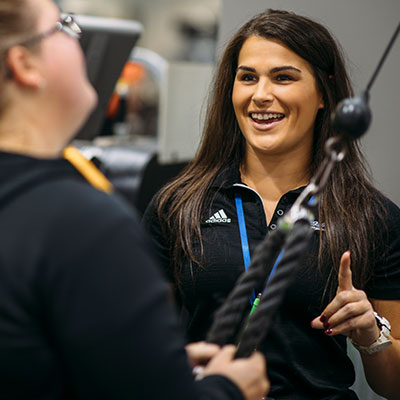Written by Lynde Weatherford | Director of Training Services, Personal Trainer, Health Coach
Goal Setting can be difficult at times because not everyone understands what a Short-Term Goal vs a Long-Term Goal means when it comes to your personal health and wellness.
Some examples of short-term goals are wanting to drop 20 lbs, deadlift 300 lbs or working out 3 times per week. The question is, what is going to keep you motivated to continue your health and fitness program after these short-term goals are achieved? The answer…LONG-TERM GOALS!
When we think long term of what we want to achieve such as having a healthy body composition to decrease our chance of chronic illness and disease, staying alive long enough for us to see our kids grow up, keep up with grandkids, travel, go hiking, be able to enjoy retirement or simply taking care of your body to stay independent in your home. These goals are what should keep us motivated to continue incorporating regular exercise, good quality sleep, decreasing our external stress, putting good foods into our body and staying hydrated. We have control over these habits and they are more easily put into action when we have a motivating goal of wanting to live a longer, higher quality of life.
Let’s go into the long-term health benefits of incorporating these habits to help motivate you to keep going after you’ve achieved your short-term goals.
Daily Exercise:
Strength Training 2-3x’s per week helps to increase or preserve your muscle tissue which decreases as part of the aging process. In order to slow down this natural progression, we all should be incorporating strength training on a weekly basis to maintain or increase our metabolism & strength and bone health so that we maintain our independence later in life.
Cardiovascular Exercise should be completed on a weekly basis to maintain or increase our heart and pulmonary function. Think of cardio as a way for you to stretch your heart muscle and dilate your lungs to improve their daily function. Just like we should be stretching our other muscles on a daily basis, cardio helps to maintain or increase the elasticity of our heart, its ability to pump blood into the circulatory system, manage blood glucose and reduce insulin intake because of an increased insulin sensitivity.
Flexibility Exercise helps to maintain the elasticity of our muscles to prevent them from getting rigid and tight which can lead to injury or pain. You can take a Yoga class for a structured stretch, utilize the foam roller to loosen up tight muscles or just stretch after a workout. Don’t stretch before a warm-up as that could lead to injury. It’s better to get some blood flow in the muscles before you stretch to increase the elasticity for a deeper stretch.
Proper Nutrition:
When we decrease our consumption of sugary or processed foods, our body can actually utilize what we eat when we stick to a whole foods nutrition plan. That doesn’t mean you can’t have sweets here and there or a bag of chips but, when we consume whole foods, our body gets what it needs to function properly. Following a whole foods nutrition plan helps to keep our blood glucose levels constant without insulin spikes which occur when we consume sugary or processed foods on a regular basis. This nutrition plan helps to decrease body fat, inflammation, regulate hormones and allows our body to function normally.
Proper Hydration:
Staying hydrated during the day helps with joint lubrication, temperature regulation, getting rid of waste through urine, sweat or bowels and protects the spinal cord as well as other tissues. Becoming dehydrated can contribute to headaches, confusion, mental fog, kidney stones and constipation.
Good Quality Sleep:
Sleep is where our brain and our bodies are able to recover from the day’s activities. This helps to increase physical performance, mental performance, improves memory and prevents incurable neural diseases. By getting a standard 7-8 hours of sleep per night, we wake up feeling rested rather than relying on caffeine to get us through the day or needing a nap.
Managing our External Stress:
Stress affects all systems of the body; musculoskeletal, respiratory, cardiovascular, endocrine, GI and nervous system. Chronic stress can wreak havoc on your entire body. The goal is to decrease daily stress by being more mindful when stress happens to not allow it to become a chronic issue. Incorporating regular exercise, getting good quality sleep and having a positive social network can help to decrease stress throughout the day. Signs of chronic stress can be muscle tension, headaches, shortness of breath or rapid breathing, increased heart rate, nausea, bloating, constipation, acid reflux, depression, anxiety and much more. If you suffer from any of these issues consistently, it is highly recommended to incorporate a daily stress release activity. This can be as simple as listening to music, reading a book, performing breathing exercises, going to the gym, talking to a friend or any activity that helps to decrease your stress from the day.
By understanding the importance of incorporating these daily health habits, you will have the tools to motivate you to continue after you have achieved your short-term goals. In the long-term, we all want to live our best lives without having our bodies become our limiting factor.
Cheers to your health and to the new year!

About Lynde Weatherford
Director of Training Services, Certified Personal Trainer & Health Coach
NSCA Certified Personal Trainer; AFPA Nutrition and Wellness Consultant
Lynde has been a personal trainer for 10+ years and couldn’t be happier with her career choice. With her parents as inspiration along with her high school years as an athlete, she acquired a true passion for health and wellness. Lynde enjoys showing others what they are capable of to achieve their health and fitness goals. During her years as a trainer, she has been able to help others achieve weight loss, gain muscle mass, live a better quality of life, and teach them skills they can use for the rest of their lives. It is her goal to coach those who think they can’t do it to thinking that they can achieve what they want despite what may be currently challenging them. She looks forward to speaking with Performance members to develop an individualized plan of action for achieving health and fitness goals.
Request a Complimentary Initial Consultation
Would you like to schedule a complimentary initial consultation with Lynde? Fill out the form below and we will get back to you within 24 business hours with availability and next steps. These appointments typically last 30-60 minutes and are scheduled in advance. Initial consultations can be conducted in person or virtually.


